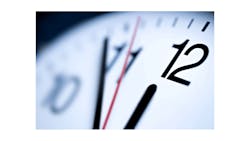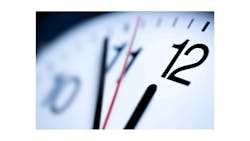When we overeat at the holidays, we apparently share something in common with people who work the graveyard shift, people who are jetlagged and late-night snackers: the internal clocks in our bodies are thrown out of whack.
According to researchers at the University of California, San Francisco (UCSF), the food clock helps our bodies make the most of our nutritional intake. It controls genes that help in everything from the absorption of nutrients in our digestive tract to their dispersal through the bloodstream, and it is designed to anticipate our eating patterns. Even before we eat a meal, our bodies begin to turn on some of these genes and turn off others, preparing for the burst of sustenance – which is why we feel the pangs of hunger just as the lunch hour arrives.
Scientist have known that the food clock can be reset over time if an organism changes its eating patterns, eating to excess or at odd times, since the timing of the food clock is pegged to feeding during the prime foraging and hunting hours in the day. But until now, very little was known about how the food clock works on a genetic level. In a new study published in Proceedings of the National Academy of Sciences, UCSF researchers has shown that a protein called PKCγ is critical in resetting the food clock if our eating habits change.
The work has implications for understanding the molecular basis of diabetes, obesity and other metabolic syndromes because a desynchronized food clock may serve as part of the pathology underlying these disorders. It might also have implications for shift workers whose circadian rhythms are upset by working the graveyard shift.
“Understanding the molecular mechanism of how eating at the ‘wrong’ time of the day desynchronizes the clocks in our body can facilitate the development of better treatments for disorders associated with night-eating syndrome, shift work and jet lag,” said Louis Ptacek, M.D., the John C. Coleman Distinguished Professor of Neurology at UCSF and a Howard Hughes Medical Institute Investigator.
That’s all very well and good for the researchers and their future work into these important health issues, but what about my current cookie cravings? I guess I’ll just have to get back on track with a healthy eating schedule on my own.
Unless, of course, this blizzard ever does show up and leaves me snowbound with a few dozen leftover Christmas cookies. Bon appétit!
About the Author
Laura Walter Blog
Senior Editor
Laura Walter is senior editor of EHS Today, a Penton Media Inc. publication. She is a subject matter expert in EHS compliance and government issues and covers a variety of topics relating to occupational safety and health. Her writing has earned awards from the American Society of Business Publication Editors (ASBPE), the Trade Association Business Publications International (TABPI) and APEX Awards for Publication Excellence.

